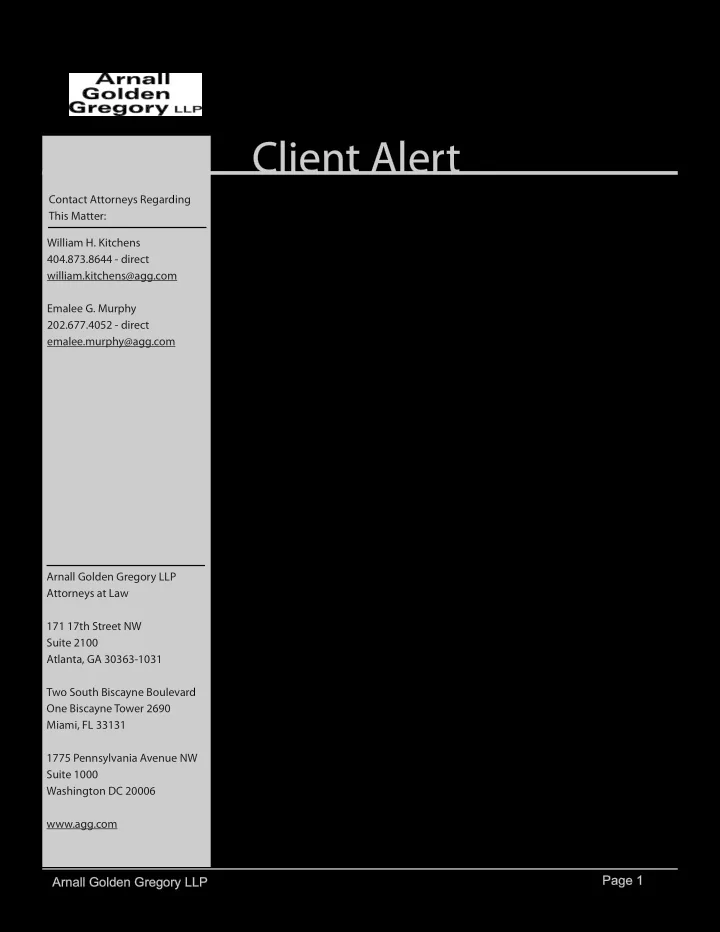

Client Alert House Holds Hearing on FDA’s Authority over Compounding Pharmacies Contact Attorneys Regarding This Matter: In light of the 2012 fungal meningitis outbreak, regulation of pharmacy drug William H. Kitchens compounding has received signifjcant attention. On April 16, 2013 the House 404.873.8644 - direct Energy and Commerce Subcommittee on Oversight and Investigations heard william.kitchens@agg.com testimony from FDA Commissioner Margaret A. Hamburg at a hearing entitled “A Continuing Investigation into the Fungal Meningitis Outbreak and Whether Emalee G. Murphy It Could Have Been Prevented.” 1 The hearing continued the Subcommittee’s 202.677.4052 - direct investigation of the fungal meningitis outbreak linked to contaminated emalee.murphy@agg.com steroids manufactured by the New England Compounding Center (NECC). As at its fjrst such hearing in November 2012, the Subcommittee examined whether the NECC contamination could have been prevented and FDA’s authority over compounding pharmacies. Drug compounding refers to the process in which a pharmacist combines, mixes, or alters various ingredients to create a medication that is “tailored to the needs” of an individual patient. 2 Compounding is generally used to prepare medications that are not commercially available, such as a drug in a lower dosage for a child, or a drug without a dye or a preservative in response to a patient allergy. FDA Testimony: We Lack Clear Enforcement Authority Commissioner Hamburg testifjed that “gaps and ambiguities” in the law Arnall Golden Gregory LLP have hindered FDA’s ability to take action against pharmacy compounding Attorneys at Law that exceeds the bounds of traditional pharmacy compounding. 3 According to the Commissioner, FDA has considered pharmacies operating outside 171 17th Street NW of traditional compounding as falling within FDA’s jurisdiction. These Suite 2100 pharmacies include those that compound drugs without a specifjc patient Atlanta, GA 30363-1031 prescription and publically advertise the availability of those drugs, which Two South Biscayne Boulevard 1 See Hearing Notice and Background Memo, Senate Health, Education, Labor, and Pen- sions Committee, A Continuing Investigation into the Fungal Meningitis Outbreak and One Biscayne Tower 2690 Whether It Could Have Been Prevented, 113th Cong. Apr. 16, 2013, available at http:// Miami, FL 33131 energycommerce.house.gov/hearing/continuing-investigation-fungal-meningitis-out- break-and-whether-it-could-have-been-prevented. A Press Release is available at http:// energycommerce.house.gov/press-release/midst-deadly-outbreak-fda-commissioner- 1775 Pennsylvania Avenue NW acknowledges-missed-opportunities-protect-public-health-highlighted-in-fdas-internal- Suite 1000 docs. At the publication of this article, the transcript was not yet available. 2 See Thompson v. W. States Med. Ctr., 535 U.S. 357, 360-61 (2002). Washington DC 20006 3 See Margaret A. Hamburg, Testimony before U.S. Congress, Senate Health, Education, Labor, and Pensions Committee, A Continuing Investigation into the Fungal Meningitis www.agg.com Outbreak and Whether It Could Have Been Prevented, 113th Cong. Apr. 16, 2013, available at http://docs.house.gov/meetings/IF/IF02/20130416/100668/HHRG-113-IF02-Wstate- HamburgM-20130416.pdf. Page 1 Arnall Golden Gregory LLP
Client Alert FDA has stated are actions that characterize them as drug manufacturers, rather than compounding pharmacies. While acknowledging that the agency could have used its enforcement discretion more aggressively to identify and regulate such manufacturing pharmacies, the Commissioner also stated that adverse court decisions to FDA enforcement authority over compounding pharmacies have impeded the agency’s ability to efgectively police them. Commissioner Hamburg also stated that the law is no longer well-suited to the compounding industry. For example, the Commissioner recognized that hospitals and clinics rely on compounding pharmacies that “function as out-sourced” producers of sterile drugs that were previously made by in-hospital pharmacies. Many such drugs are produced for “offjce use” and are not subject to the individual prescriptions that characterize traditional compounding. History of FDA’s Authority and Enforcement against Pharmacy Compounding Some courts have recognized that FDA has generally left regulation of compounding to States 4 and that “FDA as a matter of policy has not historically brought enforcement actions against pharmacies engaged in traditional compounding.” 5 Despite these observations, FDA maintains that it has authority to regulate compounding. The Food, Drug, and Cosmetic Act (FDCA) forbids introducing any “new drug” into interstate commerce without FDA approval 6 and under this provision, FDA has for many years maintained that pharmacy-compounded drugs are “new drugs, providing FDA with the power to” regulate compounding. 7 Nevertheless, FDA has opted to allow traditional drug compounding to occur by exercising its enforcement discretion to allow such activity to be largely regulated by State pharmacy boards. Only when pharmacies were engaging in signifjcant violations of the FDCA and jeopardizing public health would FDA act against compounders. This enforcement discretion was announced in a Compliance Policy Guide (CPG) on pharmacy compounding in 1992. 8 The document refmected the agency’s enforcement policy until 1997, when Congress enacted the Food and Drug Administration Modernization Act of 1997 (FDAMA). 9 FDAMA created a new Section 503A of the FDCA, which exempted compounded drug products from the adulteration, misbranding, and new drug application provisions of the FDCA if they complied with certain requirements. 10 4 See Thompson v. W. States Med. Ctr., 535 U.S. 357, 362 (2002). See also In re Wedgewood Vill. Pharm. Inc. v. United States, 270 F. Supp. 2d 525, 546 (D. N.J. 2003); FDA ‘s Warning Letter issued in 2006 to University Pharmacy, (Dec. 4, 2006), available at http://www.fda.gov/ICECI/EnforcementActions/WarningLetters/2006/ucm076192.htm#. 5 Prof’ls and Patients for Customized Care v. Shalala, 56 F.3d 592, 593, n. 3 (5th Cir. 1995). 6 21 U.S.C. §§ 331(d), 355(a). 7 See Steven K. Galston, M.D., M.P.H., Acting Director, Testimony before U.S. Congress, Senate Health, Education, Labor, and Pen- sions Committee, Federal and State Role in Pharmacy Compounding and Reconstitution: Exploring the Right Mix to Protect Patients, 108th Cong. Oct. 23, 2003. http://www.fda.gov/ForConsumers/ConsumerUpdates/ucm115010.htm. 8 Compliance Policy Guide § 460.200 (Pharmacy Compounding), May 29, 2002, available at http://www.fda.gov/ICECI/Compli- anceManuals/CompliancePolicyGuidanceManual/ucm074398.htm. 9 Pub. L. No. 105-115, 111 Stat. 2296 (1997). 10 Pub. L. No. 105-115, § 127, 111 Stat. 2328 (1997); 21 U.S.C. § 353a. Page 2 Arnall Golden Gregory LLP
Recommend
More recommend